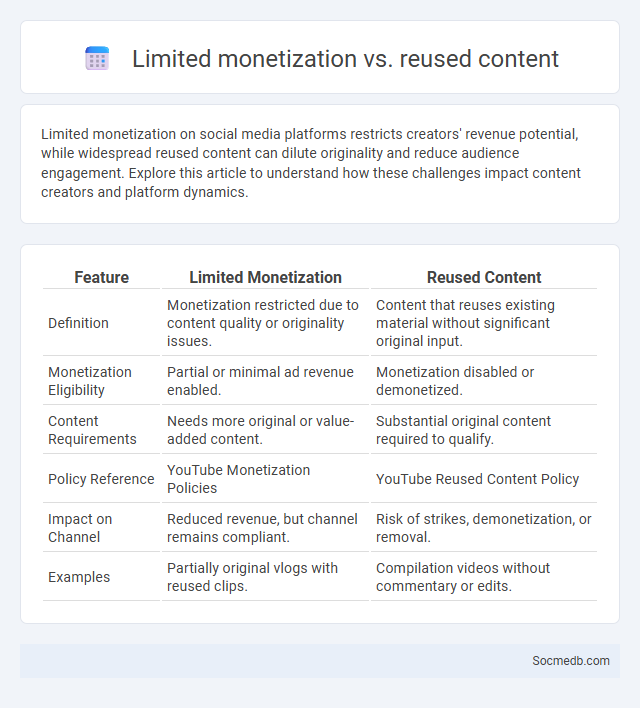
Photo illustration: Limited monetization vs Reused content
Limited monetization on social media platforms restricts creators' revenue potential, while widespread reused content can dilute originality and reduce audience engagement. Explore this article to understand how these challenges impact content creators and platform dynamics.
Table of Comparison
| Feature | Limited Monetization | Reused Content |
|---|---|---|
| Definition | Monetization restricted due to content quality or originality issues. | Content that reuses existing material without significant original input. |
| Monetization Eligibility | Partial or minimal ad revenue enabled. | Monetization disabled or demonetized. |
| Content Requirements | Needs more original or value-added content. | Substantial original content required to qualify. |
| Policy Reference | YouTube Monetization Policies | YouTube Reused Content Policy |
| Impact on Channel | Reduced revenue, but channel remains compliant. | Risk of strikes, demonetization, or removal. |
| Examples | Partially original vlogs with reused clips. | Compilation videos without commentary or edits. |
Introduction to Limited Monetization and Reused Content
Limited monetization on social media restricts your ability to earn revenue from videos containing reused content, such as clips or segments originally created by others. Platforms like YouTube use automated systems to identify copyrighted or repetitive materials, resulting in reduced ad revenue or demonetization for those videos. Understanding these rules helps you create original content that maximizes monetization potential and maintains compliance with platform policies.
Defining Limited Monetization on Content Platforms
Limited monetization on content platforms refers to restrictions placed on creators' ability to earn revenue from their posts, videos, or other shared materials. These limitations often arise due to content policies, copyright issues, or platform-specific algorithms that reduce visibility and ad placements. Platforms like YouTube and Instagram implement these constraints to maintain community standards and brand safety, affecting creators' income streams and content strategies.
What Constitutes Reused Content?
Reused content in social media refers to any material that is repurposed or recycled from existing posts, including images, videos, captions, or hashtags previously published by you or others. This type of content often involves sharing the same message across different platforms or reposting old content to maintain engagement without creating new material. Understanding what constitutes reused content helps you avoid potential copyright issues and enhances your strategy for authentic audience interaction.
How Platforms Detect Reused Content
Social media platforms detect reused content by utilizing advanced algorithms that analyze patterns, metadata, and user behavior to identify duplicate or recycled posts. Machine learning models compare new submissions against vast databases of existing content to flag potential matches for review. Your engagement with original content is prioritized, ensuring unique posts receive greater visibility and preventing spammy repetition.
Impact of Reused Content on Monetization Eligibility
Reused content on social media platforms directly affects monetization eligibility by triggering algorithmic reviews that can limit ad revenue opportunities. Platforms like YouTube enforce strict policies against repurposed content without original value, leading to demonetization or reduced earnings. Creators must prioritize unique, original content to maximize monetization potential and comply with platform guidelines.
Common Reasons for Limited Monetization
Common reasons for limited monetization on social media include low engagement rates, inconsistent content posting, and lack of niche focus, which reduce opportunities for brand partnerships and ad revenue. Your content must resonate with a specific audience to attract advertisers and increase follower interaction. Insufficient use of platform tools like analytics and paid promotions can also hinder your revenue growth potential.
Key Differences: Limited Monetization vs Reused Content
Social media platforms differ significantly in monetization opportunities, with some offering limited options for content creators to earn revenue from their original posts. Many platforms restrict direct monetization, pushing creators to reuse content across multiple channels to maximize reach and engagement. Understanding these key differences helps you strategically leverage social media for consistent income generation and audience growth.
Strategies to Avoid Monetization Issues
To avoid monetization issues on social media, focus on creating original content that complies with platform guidelines and copyright laws. You should regularly review updates to policies on advertising, sponsored posts, and content usage to ensure ongoing compliance. Implementing clear disclosure practices and maintaining transparent engagement with your audience helps protect your account from penalties or demonetization.
Best Practices for Original Content Creation
Creating original content on social media involves understanding your audience's needs and interests to deliver authentic and engaging posts. Utilize high-quality visuals, compelling storytelling, and consistent brand voice to enhance your presence and foster stronger connections. Your unique perspective and creativity set you apart, increasing engagement and building loyal followers.
Navigating Appeals and Policy Compliance
Social media platforms enforce strict policies to regulate content and ensure user safety, requiring creators to understand guidelines for successful appeals. Navigating appeals involves presenting clear evidence that content complies with platform rules, emphasizing adherence to community standards and intellectual property rights. Effective compliance strategies reduce the risk of account suspension and promote a positive online presence within evolving regulatory frameworks.
 socmedb.com
socmedb.com